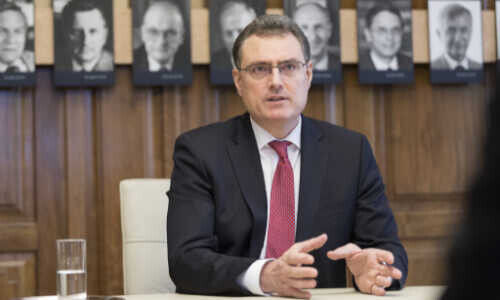The weeks-long absence of Switzerland’s chief monetary policymaker comes at a time when the central bank is under fire from both insiders and politicians.
Thomas Jordan’s unexpected heart surgery over the weekend following a routine health check surprised market-watchers. The 58-year-old Swiss, whose central banking career was forged during the 2008 bailout of UBS, is the public face of the Swiss central bank.
His weeks-long absence for health reasons leaves the SNB scrambling to replace him for day-to-day business – the key Jackson Hole meeting of central bankers later this week as well as its next policy meeting in four weeks. It also leaves the SNB without its chief advocate as it faces a barrage of criticism over everything from strategy, inflation, and payouts to sexism, climate change, and investing in weapons.
Criticism From Within
Earlier this month, academic Dirk Niepelt called for the SNB to review its strategy due to the increasingly complex world it faces. «…a strategy re-evaluation in and outside of the SNB would make sense. This should include in monetary policy terms the inflationary target band, how central the interest rate instrument is, and communication,» in Swiss daily «Neue Zuercher Zeitung» (behind paywall, in German).
While Jordan has weathered years of criticism of the central bank and the ultra-expansive monetary policy he orchestrated, Niepelt’s remarks must have hurt: the German economist oversees the SNB's own study center in Gerzensee. An SNB spokeswoman declined to comment on Niepelt’s call for action.
To Miss Jackson Hole
Jordan, a 58-year-old Biel native going into his tenth year helming the central bank, isn’t expected to return to work in Zurich for several weeks. He oversees neither the SNB department tasked with financial stability nor currency market interventions, its main policy tool against the strong Swiss franc, but the area responsible for economic affairs and international monetary cooperation.
Later this week, a widely-watched conference in Jackson Hole kicks off. The U.S.’ monetary «normalization» is likely to be announced at the annual Wyoming conference, or at the Fed’s next meeting in September, Mirabaud strategist John Plassard said.
The conference was scaled back to a virtual-only event on Friday; a spokeswoman for the SNB said it wouldn’t be taking part – a decision she said was made before Jordan’s medical emergency.
Architect Of Ultra-Generous Policy
Jordan's nearly ten-year tenure at the head of the SNB has been defined by an incredibly expansive policy including negative interest rates to dissuade foreign investment in the Swiss franc and a bloated balance sheet from intervening in foreign currency markets.
Swiss banks have griped while paying billions in surcharges on their franc deposits but Jordan has made it clear that the central bank has few other weapons in its arsenal to stem the franc's rise than negative interest rates.
Switzerland’s policy challenges including rising inflation, which Jordan in June indicated the SNB expects to be «transitory» despite nudging its forecast up by 0.2 percentage points. «We interpret this forecast as an indication that the SNB is willing to keep its policy rate unchanged for the next three years at least,» Credit Suisse economist Maxime Botteron said at the time.
Facing Down Politicians
Monetary issues aside, the SNB has become increasingly politicized during Jordan's tenure. Earlier this year, a Swiss parliamentarian launched a debate (in French) about the SNB’s payout policy, asking for the central bank’s war chest to be used towards coronavirus crisis measures.
This echoes calls by a group of economists, which in June called its payouts to Switzerland’s cantons «strikingly little» in view of its gains on foreign currency holdings, according to «Reuters». Even Jordan's predecessor, Philipp Hildebrand, who left under the cloud of a forex scandal in 2012, broke with tradition of not back-seat driving to weigh in.
Jordan has been key in the SNB’s facing down challenges including its gold reserves (2014) and sovereign money (2018). This year, the SNB faced allegations of institutional sexism and favoritism as well as criticism of its policy on climate change, on top of the monetary policy skepticism.
Deputy Misses Meeting
Jordan’s influence was especially obvious in June, when deputy head Fritz Zurbruegg’s absence at its quarterly policy session due to health reasons (see video below) went largely unnoticed and uncommented upon. Zurbruegg's deputy Dewet Moser stood in for Zurbruegg, who returned to work shortly after, the same month.
Though «alternate» governors Dewet Moser and Thomas Moser are well-known, Jordan’s deputy, 45-year-old Martin Schlegel, has rarely spoken as publicly as the other two have. A spokeswoman for the SNB said Zurbruegg will back up Jordan’s representative duties, but that Schlegel is the official deputy in the department.
The surprise absence of Jordan also lays bare that the SNB will have a regular vacancy to fill by 2025 when the 61-year-old Zurbruegg reaches retirement age. It remains to be seen how Jordan copes with his superhuman workload when he returns to work.




































